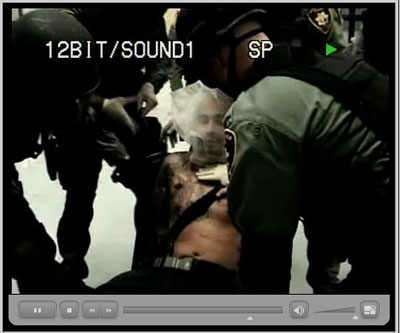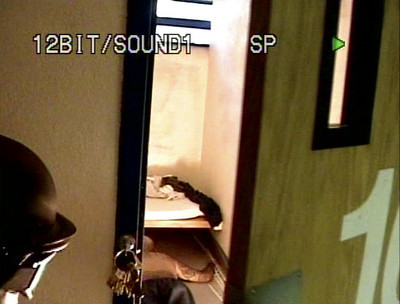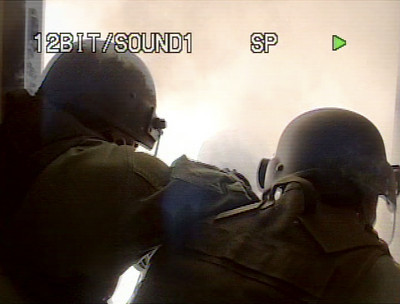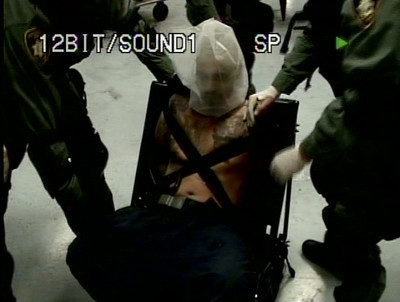Prisoner sues over use of flash-bang grenade
The treatment of a county jail inmate injured when a corrections officer detonated a flash-bang grenade in his cell is now at the center of a federal lawsuit and a Metropolitan Police Department internal affairs investigation.
The inmate, Sergio Ramirez, was stripped naked and kept in a cell for four days without medical care for his festering burns, contends the lawsuit, which seeks $3 million in damages for the Nov. 21 incident. Photos attached to the lawsuit filed Wednesday in U.S. District Court show Ramirez injured from hip to shoulder.
"I did not resist or threaten any officer in any fashion or break any rules," Ramirez wrote in a grievance dated Dec. 10.
The lawsuit names Clark County, the Metropolitan Police Department, nine corrections officers and medical providers as defendants. The officers, identified only by first initial and last name, are Sgt. K. Wooten, Sgt. D. Aspiazu and officers D. O'Barr, R. Adams, W. Hampson, H. Rodriguez, P. Torres, J. Rangel, and D. MacArthur.
In a police report, corrections officers said they needed to use the grenade because Ramirez had threatened staff. Ramirez, who is serving a life sentence for murder, bragged he was a "shot caller," or a prisoner who is a leader in the jail. He also told officers that he had "nothing to lose," the report states.
But the lawsuit, which claims multiple civil rights violations and excessive use of force, states that a video of the incident recorded by a corrections officer shows Ramirez was compliant.
"It is noteworthy that at the time Ramirez was being taken from his cell to the area where he was placed in the restraint chair, Ramirez was not resisting or spitting," the lawsuit states. "Despite Ramirez's non-resistant behavior, multiple officers ... yelled 'Stop resisting' at various time periods during the incident as a pretext for their behavior."
Las Vegas police wouldn't comment on the incident because of the internal affairs investigation and the lawsuit.
Gary Peck, executive director of the American Civil Liberties Union of Nevada and a longtime critic of controversial police actions, questioned whether it was proper for officers to use the grenade on Ramirez.
"If the allegations against this inmate are true, we certainly understand the officers' heightened safety concerns," Peck said. "But the weapon used is a powerful one and ought to be reserved only for circumstances where the inmate is being noncompliant and poses a threat to officer safety."
The police video of the incident, obtained by the Las Vegas Review-Journal, shows the officers armed with shotguns and wearing flak vests standing outside the inmate's cell on Nov. 21. They speak to Ramirez through a closed cell door.
An officer explains that they're going to pull Ramirez from his cell because he threatened staff and incited other inmates.
Ramirez made the threats about three days before the grenade incident, according to a police report.
The high-quality video shows a sergeant ordering Ramirez to lie flat on his stomach on the cell floor. He is then ordered to spread his arms out.
An officer then pulls the pin on a flash-bang grenade, opens the cell door and throws the grenade inside.
It detonates inches away from Ramirez, who is seen lying flat on his stomach without a shirt on. The deafening explosions echo inside the small cell and smoke fills the air. The officers rush in and drag Ramirez out.
"What the (expletive) was that for?" shouts Ramirez.
Flash-bang grenades are used to distract or confuse people. They produce a loud explosion and several pyrotechnic flashes. They are generally considered nonlethal and are often used by SWAT teams.
After the grenade is detonated, Ramirez is taken to a room and placed in a restraint chair. Ramirez winces as the officers strap him in because the straps rub against his wounds. Officers put a hood over his head to prevent Ramirez from spitting on or biting officers.
Ramirez is a known gang member and was at the jail on murder charges. He pleaded guilty in December to second-degree murder in the stabbing death of another man. He was sentenced to life in prison with the possibility of parole after 14 years. He is currently housed in the Nevada Department of Corrections.
E. Brent Bryson, who represents Ramirez in the lawsuit along with attorney Gabriel Grasso, said police had no reason to use a grenade on the inmate when it was clear he was complying with all the officer's commands.
"We don't even treat animals like that," he said.
Bryson said Ramirez might be a gangbanger and a convicted killer, but his treatment was still unconstitutional and akin to what happens in a Third World prison.
"We're supposed to be an orderly and progressive society," he said. "You can't be an orderly and progressive society if you allow barbaric treatment to take place in our jails."
On the day of the incident, the video shows nurses putting a salve on the injured inmate's wounds. But Bryson said Ramirez was left in the cell for four days without additional medical attention.
"After four days, Ramirez's wounds began to ooze 'green pus' and it was at this time that Ramirez was transferred to the jail infirmary," the lawsuit states.
The police report on the incident concurs that Ramirez was following officers' instructions when they used a grenade on him, but it also states that Ramirez isn't afraid to fight with officers "if it was needed to prove a point."
Las Vegas police Deputy Chief LeRoy Kirkegard said, in general, flash-bang grenades could be used on inmates if past behavior shows that they could be a danger to officers during an extraction. The grenades, he said, distract the inmates so they can be taken safely into custody.
Kirkegard, who runs the jail, said there's always the potential for an inmate to get injured when a grenade is used in a cell. But the grenades, he said, have been vetted for use in detention centers.
Dr. Richard Kiekbusch, an associate professor of criminology at the University of Texas, Permian Basin, has a background in jail administration. He said officers don't usually need to use grenades to pull an inmate out of a cell if the inmate is obedient. He didn't have first-hand knowledge of the Ramirez case and spoke in generalities.
"If you have someone complying with officers' orders, they wouldn't need to resort to that level of force," he said.
Contact reporter David Kihara at dkihara@reviewjournal.com or 702-380-1039.
ON THE WEB Video Download PDF of the lawsuit filed by inmate





















